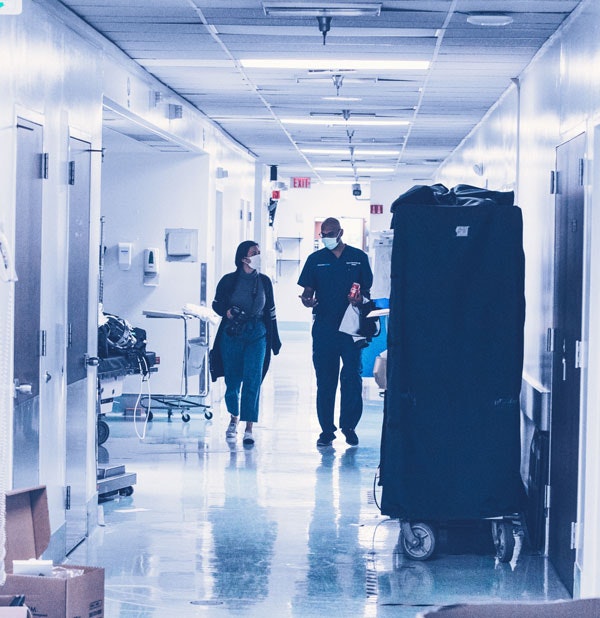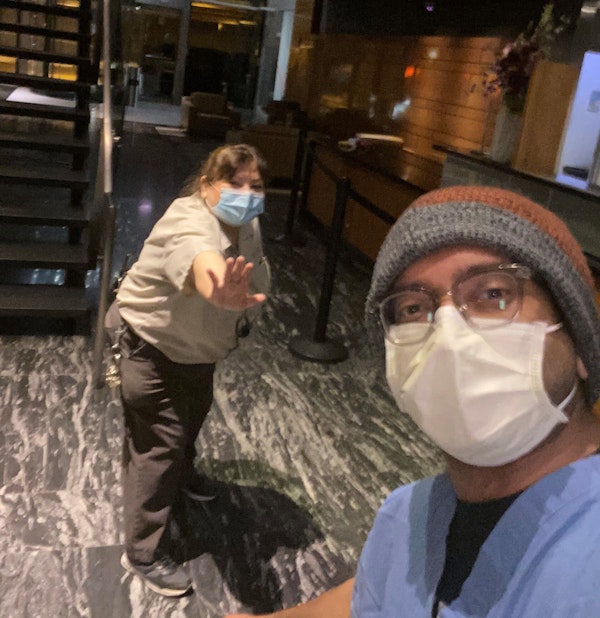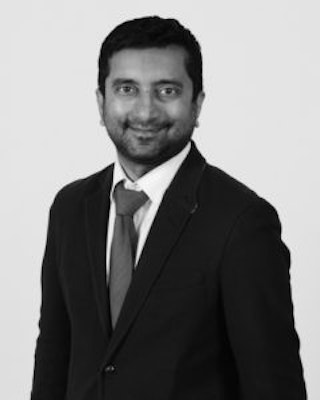In Dark Times, Americans Rise to the Challenge
As the coronavirus spread through the U.S., the medical community mobilized to make the most of every asset, even abandoned hospitals. But collaboration is key at every step, from every sector — as evidenced by these Presidential Leadership Scholars.
 St. Vincent Hospital in Los Angeles closed down weeks before COVID-19 cases exploded. The medical community united to bring the hospital back online in record time. (<a href="http://www.unicorn-productions.us/photojournalism/">Sky & Olya Unicorn Productions L.A Photography</a>)
St. Vincent Hospital in Los Angeles closed down weeks before COVID-19 cases exploded. The medical community united to bring the hospital back online in record time. (<a href="http://www.unicorn-productions.us/photojournalism/">Sky & Olya Unicorn Productions L.A Photography</a>)
Every day we seem to get more bad news. More deaths, more infections. When one “hot spot” gets knocked down, another springs up just as quickly. The news can be dispiriting. But amid the darkness of the COVID-19 pandemic, I’ve seen bursts of light as Americans rise to the challenge of confronting the virus with strength, empathy, humility, determination, and hope.
As a Presidential Leadership Scholar, I heard firsthand from Presidents Bush and Clinton that our diversity as a nation provides us with strength. I think about the presidents’ words in times like these, when diverse groups of people are coming together with courage and conviction to engage in constructive dialogue and serve our nation.
Through video chats and good old-fashioned phone calls, my fellow scholars are catalyzing action and sharing best practices about subjects like delivering telemedicine effectively and deploying gear to the frontlines. They are advocating for better policies, providing leadership and, most importantly, showing up for and taking care of one another in these hard times.
In my capacity as chief medical officer with the American Hospital Association, I had the privilege to work with the incredibly dedicated team at Providence Health when the virus first showed up in Washington state. All hands were on-deck as the team re-designed workflows, tapped new supply lines for protective equipment, and instituted new protocols to handle an illness they were still learning about. What’s more, the Providence team, alongside other teams like one from St. Barnabas Hospital in New York City, generously shared their lessons and successful practices with health teams around the nation.
My fellow [Presidential Leadership Scholars] … are advocating for better policies, providing leadership and, most importantly, showing up for and taking care of one another in these hard times.
Meanwhile, in Los Angeles, two fellow Presidential Leadership Scholars, surgeon Anand Annamalai and anesthesiologist Sunny Jha, looked at a shuttered hospital and saw the opportunity to demonstrate leadership and save lives. Just a few weeks before the first COVID-19 cases were reported in America, St. Vincent’s hospital, one of Los Angeles’s oldest, was closed down, a victim of its parent company’s recent bankruptcy.
In March, the state of California stepped in to lease the hospital to handle “surge” cases of COVID-19 patients, and that’s when Anand called on Sunny to join the effort. “He said we were being tasked with re-opening the hospital,” Sunny recalls. “I said, ‘With what army?’”
 Anesthesiologist Sunny Jha (far left) and surgeon Anand Annamalai (right), both Presidential Leadership Scholars, try on face shields with the team at St. Vincent's. (<a href="http://www.unicorn-productions.us/photojournalism/">Sky & Olya Unicorn Productions L.A Photography</a>)
Anesthesiologist Sunny Jha (far left) and surgeon Anand Annamalai (right), both Presidential Leadership Scholars, try on face shields with the team at St. Vincent's. (<a href="http://www.unicorn-productions.us/photojournalism/">Sky & Olya Unicorn Productions L.A Photography</a>)
The army that would ultimately make the re-opening of St. Vincent’s possible included clinicians, case managers, orderlies, technicians, government officials, and long-time hospital administrators from around Southern California. When they entered the building, the team found cardboard boxes everywhere, filled with the remnants of the former hospital.
Less than one month later, the new St. Vincent’s was ready to accept its first patients. As of this writing, a team of about 500 people work in the facility, caring for some of the toughest COVID cases in America’s largest county.
It goes without saying that those 500 people are putting themselves at risk. I asked Sunny why he got involved in the project, and why he continues to go into the hospital to care for patients. “Is it scary? Yes,” he admits. “Throughout this process we’ve all had a degree of fear and anxiety. But it just seemed like the right thing to do.”
 Presidential Leadership Scholar and anesthesiologist Sunny Jha works to get the medical equipment up and running at St. Vincent's. (<a href="http://www.unicorn-productions.us/photojournalism/">Sky & Olya Unicorn Productions L.A Photography</a>)
Presidential Leadership Scholar and anesthesiologist Sunny Jha works to get the medical equipment up and running at St. Vincent's. (<a href="http://www.unicorn-productions.us/photojournalism/">Sky & Olya Unicorn Productions L.A Photography</a>)
Back in my home state of Illinois, I recently visited Family Christian Health Center (FCHC), a federally qualified health center just south of Chicago where I’ll be treating patients this summer. Clinics like FCHC are on the frontlines of the pandemic, delivering healthcare to America’s most vulnerable, low-income populations.
When I arrived at the clinic, I saw Dr. LaVerne Barnes, who oversees the clinic’s operations, testing a family in their car for coronavirus. Dr. Barnes told me that, because people are sheltering in place and most of the clinic’s operations have gone digital, revenues are down. Dr. Barnes considered laying off many members of her staff.
The army that would ultimately make the re-opening of St. Vincent’s possible included clinicians, case managers, orderlies, technicians, government officials, and long-time hospital administrators. … Less than one month later, the new St. Vincent’s was ready to accept its first patients.
But she didn’t. “Tell them to apply for unemployment?” Dr. Barnes asks incredulously. “Our staff come from the community, so our staff are also our patients.” To avoid layoffs, Dr. Barnes has redeployed her staff to different parts of the clinic. With few people seeking dental care, the clinic’s dentist is performing COVID tests in one of two triage tents set up in the parking lot. Other staff members are doing “senior checks,” calling older adults at home to see how they’re coping.
The pace of work over the last two months has been relentless, says Dr. Barnes. But she’s not complaining. “What the devil made for bad, God made for our good,” she says, joyously explaining that local restaurants recently prepared 500 grocery boxes for the clinic to distribute to community members.
Beyond the social needs that are critical, we continue to need testing and support for public health. I am seeing public health professionals embrace that responsibility. They are working with hospitals, the private sector, and city residents to fight the virus and build the momentum that will eventually allow us to recover and rebuild.
No doubt my healthcare colleagues on the frontlines of the virus are rising to the occasion and working hard to save lives. But they’re not the only people I’ve seen in the last three months who inspire me daily. Carmen Lam, an essential worker who serves as the porter in my Chicago high-rise, cleans the public spaces on the first and second floors. Since the virus hit, she hasn’t missed a day of work.
 Jay Bhatt (foreground) with essential worker Carmen Lam (via Jay Bhatt)
Jay Bhatt (foreground) with essential worker Carmen Lam (via Jay Bhatt)
Carmen, who is originally from Guatemala, has worked in our building for six years. I often stop to chat with her — these days from behind masks and with six feet between us— as she cleans the elevators and disinfects the mail room. I ask about her two grandchildren. She asks about my sister and parents, who are sheltering in place nearby.
Carmen’s one of the most positive, joyous people I’ve ever met. Nevertheless, the virus is scary, so I asked her why she still comes to work. “I love my work,” she says, adding that the building’s residents are like a family to her, and she’s not about to let them down. “These people need me,” she says.
Anand, Sunny, LaVerne, and Carmen. They are special people. And their stories remind us that through courage, kindness, intentional connection, and compassion, we can all work to lift our country up to a brighter future.
Their stories remind us that through courage, kindness, intentional connection, and compassion, we can all work to lift our country up to a brighter future.
The Catalyst believes that ideas matter. We aim to stimulate debate on the most important issues of the day, featuring a range of arguments that are constructive, high-minded, and share our core values of freedom, opportunity, accountability, and compassion. To that end, we seek out ideas that may challenge us, and the authors’ views presented here are their own; The Catalyst does not endorse any particular policy, politician, or party.

